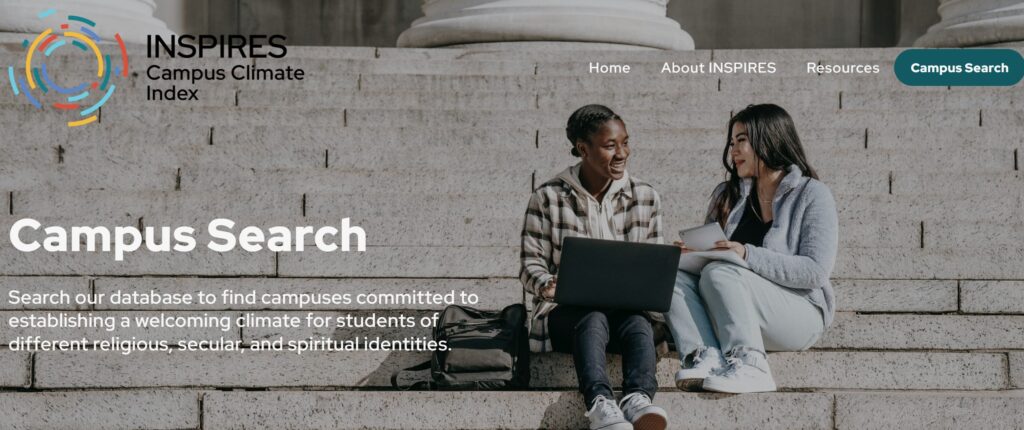 By Renee L. Bowling, Laura Dahl, and Matthew J. Mayhew
By Renee L. Bowling, Laura Dahl, and Matthew J. Mayhew
The topic of diversity in education elicits strong feelings across the political spectrum, yet religious, secular, and spiritual (RSS) diversity is often left out of the conversation despite its importance to students’ lives. Reactions seen on university campuses in response to the Israel-Hamas war have underscored the importance for educators, administrators, and counselors to engage with this underrepresented form of diversity and its intersections with history, culture, and politics to understand how to support diverse worldview communities on campus.
The Interfaith Spiritual, Religious, and Secular Index, or INSPIRES Campus Climate Index, measures an institution’s efforts to establish a welcoming climate for students of diverse RSS identities. Built by researchers at The Ohio State University and North Carolina State University, INSPIRES is grounded in data gathered through the Interfaith Diversity Experiences and Attitudes Longitudinal Survey (IDEALS). The project first began in 2020 and is now in its third intake. It is funded by the Arthur Vining Davis Foundations, an organization committed to courageous multi-faith efforts.
More than 230 U.S. campuses have participated in the INSPIRES Index, with about 60 currently sharing their results publicly.
Each school’s “overall welcome” is scored from one to five stars, as well as in seven domains: structural diversity, space for support and spiritual expression, institutional behavior, academic engagement, extracurricular engagement, religious accommodations, and efforts to reduce negative engagement. A few specific areas of measurement include:
- Dining hall options for students with religious dietary restrictions such as halal, kosher, and vegetarian.
- Whether faculty are required or encouraged to include information about religious accommodation in their syllabi.
- Whether campuses include meditation/prayer spaces for students of all religious, secular, and spiritual identities.
Previous research shows that a student’s RSS identity influences how they experience the campus climate, impacting students’ sense of belonging and engagement, and that religious identities are often intersectional with other identities. Students with minority RSS backgrounds may feel pressure to conform or self-silence within or outside of the classroom, with the most underrepresented groups facing the most barriers to receive religious accommodations, such as dietary needs.
RSS identities and accommodations are something all higher education institutions must consider, as many students are affected, including Indigenous and international students. Even evangelical students who are part of the Christian majority often report feeling that their worldview is not welcome in classrooms with an academic secular bias. The INSPIRES Index helps campuses assess and benchmark how they are doing in creating welcoming climates for diverse RSS worldviews in comparison to their peer institutions. It also provides a tool counselors may use in assisting students in the college search, particularly those applicants for whom the RSS identity is salient.
Further, there is an appetite for tools that go beyond traditional ranking methodologies and that personalize college recommendations based on students’ priorities. The INSPIRES Index offers one such tool for families for whom RSS identity matters.
In an increasingly diverse society, a sense of belonging matters for student engagement, persistence in college, and for students to feel like they have spaces of belonging. Attention to worldview diversity by public campuses is an acknowledgment that education is never neutral; it is always informed by a perspective.
In the past two years, the 230 U.S. campuses that have joined the INSPIRES Index have included public, private nonsectarian, mainline Protestant, Evangelical, and Catholic institutions. More institutions are invited to participate in the INSPIRES Index. Participation is free due to the generosity of the Arthur Vining Davis Foundations, and only requires a campus representative to fill out a single survey. The institution will then receive an individualized scorecard and report — which they can decide to make public-facing or not — that can be used for benchmarking and improving institutional practice. Institutions may reach out via email to inspiresindex@osu.edu to join. Counselors are encouraged to share the INSPIRES Index website with students and families and to incorporate it as a resource in their work.
Renee L. Bowling is an International ACAC member, chair of NASPA’s Spirituality and Religion in Higher Education Knowledge Community, and member of The Ohio State University’s College Impact Lab that developed the INSPIRES Index. You can reach her at bowling.187@osu.edu. Laura Dahl is research director of the College Impact Lab at The Ohio State University and formerly a researcher on the IDEALS study. Matthew J. Mayhew is the William Ray and Marie Adamson Flesher Professor of Educational Administration at The Ohio State University, co-leader of the INSPIRES Index project and co-principal investigator of the IDEALS study.
